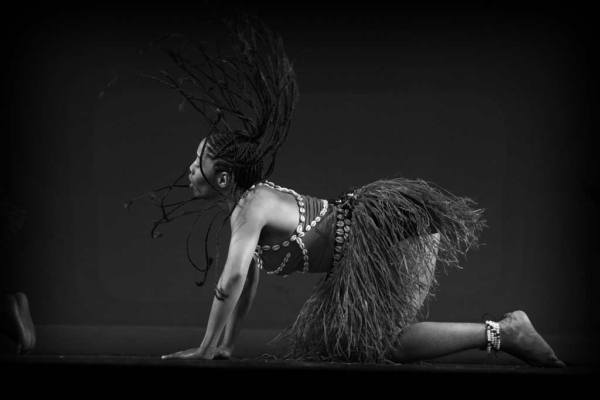Urban dictionary defines twerking as “rhythmic gyrating of the lower fleshy extremities in a lascivious manner with the intent to elicit sexual arousal or laughter in ones intended audience.” Recently, twerking has received considerable notoriety, thanks to a much (much, much) discussed awards show performance by pop star Miley Cyrus. The incident is a sad reminder that much of White America’s knowledge of Black culture comes through media imagery. In Cyrus’s case, that imagery includes parading around using Black women as props, in a misguided attempt to shed her Disney Channel roots and acquire some “street cred.” What has been lost in many of these conversations about Cyrus, twerking and perceptions of Black culture in the U.S. is the extent to which dances like twerking are deeply ingrained in African and Afro-diasporic history and traditions.
The actual term “Twerking” comes from New Orleans’ early 90s bounce scene. It was a party dance, not unlike the cat daddy or the dougie, where men and women would wind and thrust their hips to the bells and chimes of the beat. Modern day twerking is very similar to Mapouka, a dance from Côte d’Ivoire. The dance has existed for centuries and consists of a series of movements emphasizing the buttocks. Mapouka requires great skill and isolation of muscles. From its origin, Mapouka was a celebratory dance for festivals by Africans and was widely accepted because people believed that this dance led to encounters with God. Research shows that Mapouka has been used as a way to decide mates for young men and women as well.
Over time, this culturally meaningful celebration has become increasingly controversial. Modern Mapouka places a much grater influence on the mating aspects of the tradition incorporating a more sexual and Western attitude. In West Africa the dance had been looked down upon and described as an infectious disease by officials. Mapouka dancers were being chased away by officials in many neighboring countries like Togo and Niger. Mapouka was even banned from Ivorian Television at one point. So before you go out with your friends for “twerk sessions”, remember the culture and rich history and respect it.
by Ebony Wiggins




cherm999@newschool.edu
/ November 1, 2013That was very insightful. I was not aware of the history behind this dance. Thank you for sharing. Melissa Cherizola
LikeLike
Jami G
/ November 1, 2013Before reading this post, I did not know of the history and cultural references behind twerking. Now I know that this dance is more than just Hannah Montana trying to gain some edgy “street cred” by dancing around a stage with a couple of oversized teddybears. I believe that Ms.Cyrus and the mainstream media are in serious need of a history lesson…
LikeLiked by 1 person
Jenna Engebretson
/ November 5, 2013I agree with Jami – I had no idea there was such a history behind twerking. Admittedly I avoid any and all news about Miley Cyrus, but it would have been nice to have at least one news report provide the rich history behind what has, like most things TV touches, been sexualized and exploited.
LikeLiked by 1 person
Samar S.
/ November 5, 2013Thank you for this post! It is fascinating to learn about new cultures and how twerking has historical context and importance.
LikeLike
Samantha Erskine
/ November 9, 2013Thank you for sharing a little about the history of twerking. I personally find the white fetishization of Black women’s behinds offensive. I don’t agree with the barrage of “slut shaming” remarks about Miley during her VMA performance but I’m so over the racist sexualization of Black women’s bodies. What’s interesting to me is that while Black culture is often ridiculed and Black women are often viewed as inherently “lascivious,” it’s not until Afro-Diasporic cultures passes through white filters, that it suddenly becomes “mainstream.”
LikeLiked by 2 people
Bryan Counts
/ December 3, 2013This is quiet a revealing history on what we today know as “Twerking.” It is always funny to me how, we can take something such as a tribal dance and make it into something sellable, brandable and in our societies case sexual. I think more than anything this piece is a reminder that all things have a more historical origin, and we have become so jaded as a society that we can no longer see the facts from fiction … we are slowly loosing our grip on the past, and frankly it is a little sad. Great work on this article … Now I am off to watch more funny videos on Twerking “video for the soul!”
LikeLiked by 1 person
Jessica B
/ February 6, 2014Thank you writing a post about twerking. As this form of dance has become popular in mainstream American society, I wonder if we as Americans caught up in the latest fad, forget its origins. I also wonder if Miley Cyrus acknowledges where the inspiration for her new album and subsequent dance moves originate form. Although the mating reference infers that twerking has some sort of sexual meaning, do we forget that such moves popularize the sexualization of women in a negative light? (Not that I do enjoy twerking once and awhile at the club!) How can we retain the African dance culture before mainstream society claims it as their own?! Just some questions I think about as I see twerking on MTV.
LikeLiked by 2 people
Jacob Tautiaga
/ November 2, 2014I’m confused. Did twerking actually come from Africa or is it just similar to the Mapouka dance?
LikeLike
Phyllis
/ September 4, 2015Thank you for this article! It helps to facilitate more of a cultural exchange rather than the cultural appropriation that continues to occur.
LikeLiked by 1 person